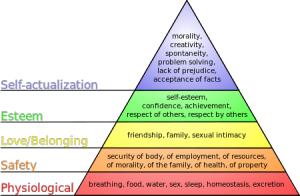Have we come to a point in society where we are focussed on filling our wants rather than merely our needs? And does this place us higher on Maslow’s hierarchy than people who are only meeting their needs? Will the iWatch and the IPhone 6 lead us closer to the self-actualization Maslow says is at the top of the pyramid?
I am going to buy an iWatch — or whatever Apple is calling the new wearable “smart device” it’s announcing on September 9, but not shipping until next year because it probably doesn’t work yet.
I am also buying an iPhone 6.
I don’t need either of them.
And neither does anyone else.
That’s the problem with the current crop of technology products. No one really “needs” them. That’s the difference between the iPhone 6 and the first iPhone. Everyone needed that, or a smart phone like it, because smart phones connected the world, through both voice and data. But the very people who still need to be connected to the world, those in developing nations, cannot afford iPhones, and will have to be content with Androids. Which are quite good these days, and much less expensive.
Everyone thought they needed an iPad, too, when Steve Jobs introduced it. But in a matter of three years the Android tablet and the Android phone with the bigger screen have both eclipsed the iPad — and even made us question whether we need two devices. In Asia, they use the “phablet,” a single device with both functions; perhaps that’s enough.
And now comes the iWatch. With Google Glass and a drawer full of languishing fitness devices I don’t need that either, except to try it and write about it. I could say for educational reasons. But wouldn’t an African or Asian man sporting his first smart phone look at the iWatch and laugh? “A device that saves me the trouble of taking my phone out of my pocket? Man, I don’t even have a pocket.”
Somehow, here in the “first world.” where our children are not getting educated for jobs, the middle class can no longer achieve upward mobility, the health care system is crooked and perhaps broken, the government is paralyzed, and war surrounds us, have we convinced ourselves we may “need” smart watches?
I’ll leave it to people smarter than myself to tell me whether that’s true. The recent emergence of the collaborative economy, the reluctance of the Millennials to consume in the old ways ( houses and cars), could signal a coming shift in consumerism. If that’s true, the smart watch (especially the iWatch, which will be the luxury brand) will either fall by the wayside or enjoy only a narrow niche of customers — not unlike the Louis Vuitton purse. But if Millennials decide all that collaborating and sharing doesn’t include one’s collection of fancy watches, then the iWatch has a bright future.



